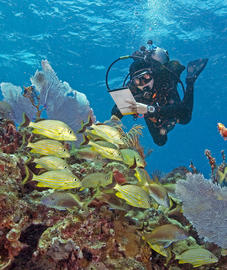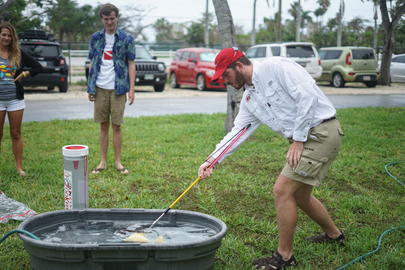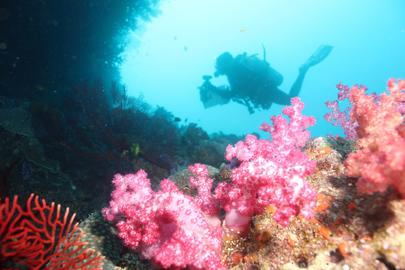REEF Board of Trustees members Ned and Anna DeLoach teach fish identification and citizen science programs each summer at Buddy Dive Resort in Bonaire. Last summer, Scuba Diving magazine editor-in-chief Mary-Frances Emmons joined Ned and Anna to conduct some fish surveys as part of REEF's Volunteer Fish Survey Project.
Written by REEF Board of Trustees members Ned and Anna DeLoach, this article is about the Grouper Moon Project - a successful, 16-year collaboration between REEF, the Cayman Islands Department of Environment and several academic institutions to save the critically endangered Nassau Grouper.
Spring 2019 Marine Conservation Interns Lara Noren and Alyssa Panzer will be presenting about personal sustainability at Divers Direct in Key Largo. Lara and Alyssa will share goals, fun facts, and home tips on recycling and practicing good marine conservation habits in your daily life. Attendees will also get to make their own toothpaste to take home! Workshop is free and open to the public.
REEF's Field Survey Trips Program is prominently featured in this article from NAUI's publication for dive professionals.
This article discusses the impacts of citizen science and highlights several citizen science opportunities, including the Volunteer Fish Survey Project.
Hakai Magazine describes the importance of citizen science in studying the ocean, and highlights the Volunteer Fish Survey Project as well as several other prominent ocean citizen science programs.
REEF is offering a series of free Lionfish Collection and Handling Workshops throughout south Florida and the Keys. Each workshop will include a classroom session covering the background of the invasion, lionfish biology, ecological impacts, current research, collecting and handling techniques, and other ways you can get involved. Attendees can obtain a permit to collect lionfish within the Sanctuary Preservation Areas (SPAs) in the Florida Keys National Marine Sanctuary using hand nets only.
We are excited to share details of two recent scientific publications that leverage the long time-series of species composition information that our citizen science surveys provide. The first study looked at how reef fish community assemblages have changed over time at several sites in Florida. In particular, the researchers looked for evidence of biological homogenization (increasing species similarity between sites.) Homogenization can alter the ecological function of systems as well as the economic value associated with ecosystems. Dr.
This paper describes cleaning behavior that had previously not been documented in a particular species. The findings are the result of the keen eyes of two active REEF surveyors – Carol Cox and Frank Krasovec. Carol frequently surveys in the northern Gulf of Mexico and Frank surveys in his home state of North Carolina. Both photographed Yellowprow Goby, Elacatinus xanthiprora, cleaning other fishes, which is not typical for the species. Scientist and frequent REEF advisor, Dr.



